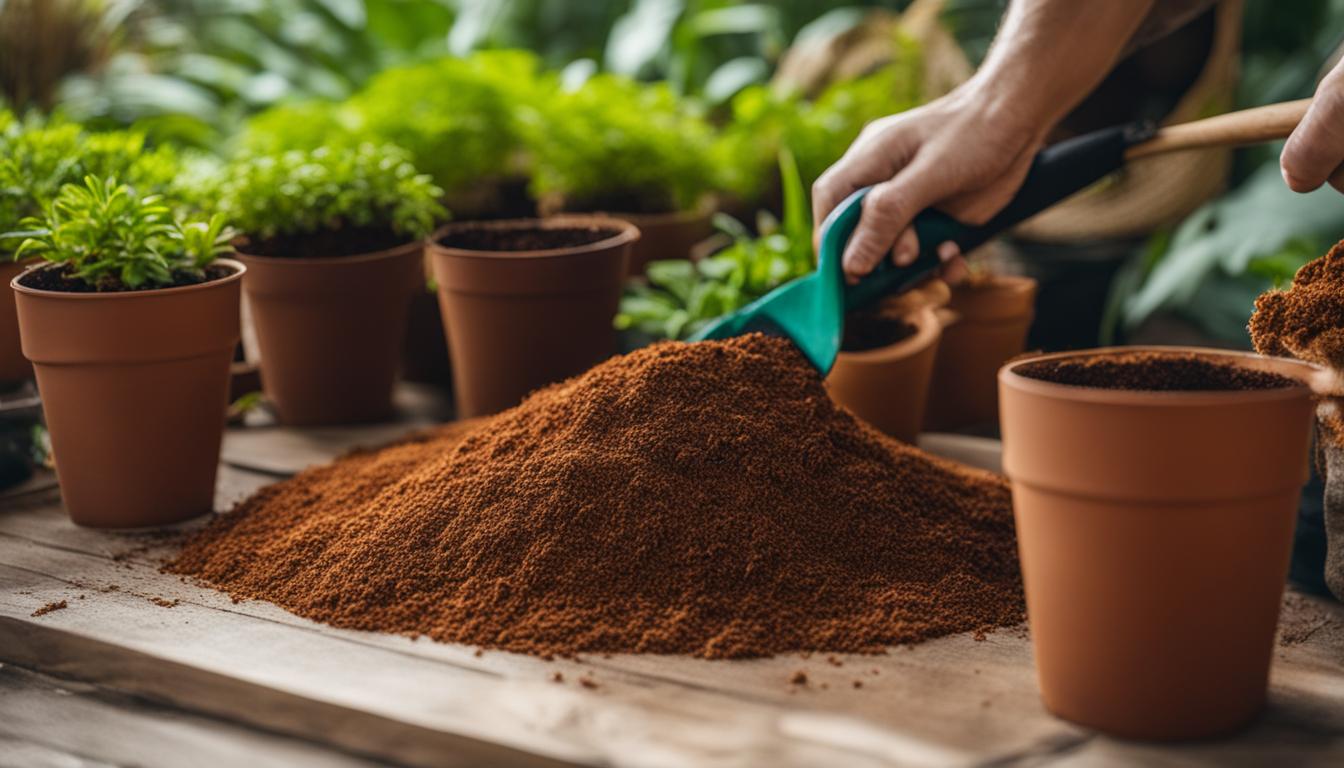
As a gardening enthusiast, I am always on the lookout for sustainable alternatives that can enhance the health and productivity of my plants. That’s why I have turned to using coconut coir in my potting mixes. Not only is coconut coir a renewable resource, but it also offers a multitude of benefits for gardening success.
Coconut coir, a byproduct of the coconut processing industry, is a perfect substitute for peat moss. It has the remarkable ability to hold up to 10 times its weight in water, making it ideal for improving moisture retention in potting mixes. This means that even during dry spells, my plants stay hydrated and thrive.
But that’s not all. Coconut coir also possesses natural anti-fungal properties, which help prevent the buildup of fungal and algae in my plants’ growing medium. This natural deterrent protects my plants from pests and diseases, giving them a healthier growing environment.
Another advantage of using coconut coir is its neutral pH. Unlike other additives that can affect soil acidity, coconut coir has a balanced pH level, making it suitable for a wide range of gardening applications without compromising the soil’s natural balance.
And let’s not forget about its environmental benefits. Coconut coir is biodegradable, meaning it breaks down naturally over time, reducing waste and leaving a smaller carbon footprint. This makes coconut coir not only a great choice for my plants but also for the planet.
If you’re looking to boost your gardening success while being mindful of the environment, consider incorporating coconut coir into your potting mixes. Your plants will thank you, and you’ll enjoy the many benefits that this versatile growing medium has to offer.
Key Takeaways:
- Coconut coir is a sustainable alternative to peat moss in potting mixes.
- It has excellent water retention capabilities, keeping your plants hydrated.
- Coconut coir’s anti-fungal properties help prevent pests and diseases.
- Its neutral pH makes it suitable for various gardening applications.
- Coconut coir is biodegradable, reducing waste and environmental impact.
What is Coconut Coir?
Coconut coir is a versatile and sustainable alternative to peat moss in gardening. It is made from the fibrous inner shell of coconuts and is typically discarded by producers during coconut processing. This natural byproduct is a renewable resource that can be upcycled and used to improve soil structure and water retention in gardens.
Unlike peat moss, which takes thousands of years to regenerate and is considered a non-renewable resource, coconut coir is readily available and can be harvested without causing environmental harm. It is a cost-effective and eco-friendly option for gardeners who want to enhance their gardens while minimizing their ecological footprint.
Coconut coir’s fibrous texture allows it to hold up to 10 times its weight in water, making it an excellent choice for improving moisture retention in potting mixes. It also has anti-fungal properties that help reduce fungal and algae buildup, making it a natural deterrent for pests and diseases. With its neutral pH and biodegradable nature, coconut coir is a safe and environmentally-friendly addition to any garden.
| Benefits of Coconut Coir | Description |
|---|---|
| Renewable Resource | Coconut coir is a byproduct of coconut processing and is a sustainable alternative to peat moss. |
| Improved Soil Structure | Coconut coir creates space within heavy clay particles, allowing for better drainage and root expansion. |
| Enhanced Water Retention | Coconut coir can hold up to 10 times its weight in water, improving moisture retention in potting mixes. |
| Natural Pest and Disease Deterrent | Coconut coir has anti-fungal properties that help reduce fungal and algae buildup, minimizing pest and disease issues in gardens. |
| Neutral pH | Coconut coir has a neutral pH, making it suitable for various gardening applications without affecting soil acidity. |
| Biodegradable | Coconut coir is biodegradable, making it an environmentally-friendly choice for gardeners. |
Benefits of Using Coconut Coir in Gardening
Coconut coir offers a sustainable alternative to peat moss in gardening, providing numerous benefits for gardeners. One of the key advantages is its ability to improve soil structure.
When added to heavy clay soils, coconut coir creates space between particles, allowing for better drainage and root expansion. This is essential for promoting healthy plant growth and preventing waterlogged conditions that can lead to root rot.
In addition to improving soil structure, coconut coir has excellent water retention properties. It has the ability to hold up to 10 times its weight in water, ensuring that plants have access to moisture even in dry spells or when water is limited. This is particularly beneficial for gardeners in arid regions or those who are looking to conserve water.
Another advantage of using coconut coir in gardening is its anti-fungal properties. It helps reduce fungal and algae buildup in growing media, which can be beneficial for plant health.
By naturally deterring pests and diseases, coconut coir acts as a natural defense mechanism, reducing the need for chemical pesticides or fungicides.
Benefits of Using Coconut Coir
| Benefit | Description |
|---|---|
| Improves Soil Structure | Creates space for better drainage and root expansion. |
| Enhances Water Retention | Can hold up to 10 times its weight in water, ensuring plants have access to moisture. |
| Reduces Fungal and Algae Buildup | Acts as a natural deterrent for pests and diseases. |
| Neutral pH | Does not affect soil acidity, making it suitable for a wide range of plants. |
| Biodegradable | Environmentally-friendly option that breaks down naturally over time. |
Coconut coir has a neutral pH, which makes it suitable for a wide range of plants. It does not affect soil acidity, allowing gardeners to use it without worrying about altering the pH levels of their soil.
Also, coconut coir is biodegradable, meaning it breaks down naturally over time without harming the environment.
Using coconut coir in gardening provides a sustainable alternative to peat moss and offers several benefits. It improves soil structure, enhances water retention, reduces fungal and algae buildup, has a neutral pH, and is biodegradable.
With these advantages, coconut coir is a versatile and environmentally-friendly option for gardeners looking to improve their gardening success.
How to Use Coconut Coir in Gardening
Coconut coir is a versatile material that can be used in various gardening applications. Whether you’re looking to improve clay soils, enhance sandy soils, create a potting mix, or propagate succulents, coconut coir can be a valuable addition to your gardening toolkit.
If you’re dealing with heavy clay soils, coconut coir can help break up compacted soil particles and improve drainage.
Simply spread a layer of coconut coir in your existing garden bed and incorporate it into the soil using a garden fork. This will create space within the clay particles, allowing for better water movement and root expansion.
On the other hand, if you have sandy soils that drain too quickly, coconut coir can be used to add organic matter and improve moisture and nutrient retention.
Mix coconut coir with your native soil and compost to create a clumpy, friable structure that can hold onto water and nutrients more effectively.
If you’re interested in creating your own potting mix, coconut coir can serve as a fantastic base material. Mix equal parts coconut coir and soil, and add in some fertilizer or compost for added nutrients. This will provide a well-draining and moisture-retaining medium for your potted plants.
Lastly, coconut coir is also a great choice for propagating succulents. Its texture and moisture-holding capabilities make it an ideal medium for rooting succulent cuttings. Give your succulents the best chance of success by using coconut coir in your propagation process.

Comparing Different Uses of Coconut Coir in Gardening
| Gardening Application | Method |
|---|---|
| Improving Clay Soils | Spread a layer of coconut coir in an existing garden bed and incorporate it into the soil using a garden fork. |
| Enhancing Sandy Soils | Mix coconut coir with native soil and compost to improve moisture and nutrient retention. |
| Creating Potting Mix | Mix equal parts coconut coir and soil, and add fertilizer or compost for a well-draining and nutrient-rich medium. |
| Propagating Succulents | Use coconut coir as a rooting medium for succulent cuttings. |
As you can see, coconut coir can be a valuable asset in your gardening endeavors. Whether you need to improve soil structure, enhance water retention, or provide an ideal medium for propagating succulents, coconut coir offers numerous benefits. Give it a try and see the positive impact it can have on your garden.
Overcoming Challenges with Using Coconut Coir for Seed Starting
While coconut coir is a popular choice for seed starting, it does come with its challenges. One of the main challenges is its naturally high salt content, particularly potassium and chloride.
To overcome this, the coir needs to be buffered with calcium nitrate to replace the potassium and chlorides with calcium and nitrates. This buffering process is not suitable for organic growing, as calcium nitrate is not an organic fertilizer.
Another challenge is the slow decomposition rate of coconut coir compared to peat moss, which means it releases fewer nutrients into the water. This can be addressed by using nutrient solutions specifically formulated for use with coconut coir.
These solutions provide the necessary nutrients for healthy seedling growth and compensate for the slow nutrient release of the coir.
Despite these challenges, coconut coir remains a popular choice for seed starting due to its excellent water retention and soil structure improvement properties.
By understanding and addressing these challenges, gardeners can successfully incorporate coconut coir into their seed starting process and enjoy the benefits it offers.
Comparing Coconut Coir and Peat Moss for Seed Starting
| Factors | Coconut Coir | Peat Moss |
|---|---|---|
| Salt Content | High salt content, mainly potassium and chloride | Low salt content |
| Decomposition Rate | Slow decomposition, releases fewer nutrients | Faster decomposition, releases more nutrients |
| Water Retention | Excellent water retention properties | Good water retention properties |
| Soil Structure Improvement | Improves soil structure by creating space for root growth | Improves soil structure by increasing aeration |
Coconut coir has a higher salt content and slower decomposition rate compared to peat moss. But it excels in water retention and soil structure improvement, making it a valuable option for seed starting.
Different Forms of Coconut Coir for Gardening
When it comes to using coconut coir in gardening, there are different forms available to suit various applications. One option is loose media, like coco coir, which can be used alone or mixed with other amendments such as perlite. This loose coconut coir provides a great balance of water retention and aeration for your plants.
Another form of coconut coir is compressed blocks. These blocks are soaked in water to rehydrate them, and then broken apart for use. Compressed coconut coir blocks are convenient and easy to store, making them a popular choice for gardening enthusiasts.
For specific hydroponic uses, shaped coconut coir products like basket liners and mats are available. These products are designed to provide excellent water retention and nutrient flow, making them ideal for hydroponic systems.
If you’re looking for a hassle-free option, charged coconut coir may be the way to go. Pre-treated with a nutrient mix, charged coconut coir makes it easier for new plants and transplants to establish and grow. It’s a convenient choice for those who want to give their plants a head start.
Finally, there are coconut coir mixes that combine coconut coir with other ingredients like perlite. These mixes offer improved airflow around the roots of plants, promoting healthy growth. They’re a versatile option for various gardening needs.
After reading this, check out our other articles on:
- Guide to Choosing Hydroponic Mediums for Plants
- Learn How to Make Well-Draining Soil Mix for Healthy Plants
FAQ
What are the benefits of using coconut coir in gardening?
Coconut coir is a sustainable alternative to peat moss that improves soil structure and water retention. It has anti-fungal properties and is environmentally-friendly.
How can coconut coir be used in gardening?
Coconut coir can be used to improve clay soils, sandy soils, create potting mixes, and propagate succulents.
What are the challenges with using coconut coir for seed starting?
Coconut coir has a high salt content, which needs to be buffered with calcium nitrate. It also decomposes slowly and releases fewer nutrients compared to peat moss.
What forms of coconut coir are available for gardening?
Coconut coir is available as loose media, compressed blocks, shaped products like basket liners and mats, charged coir, and coconut coir mixes.

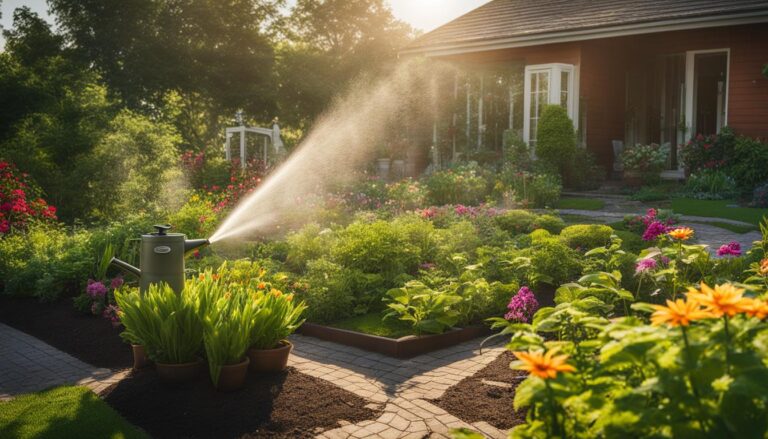
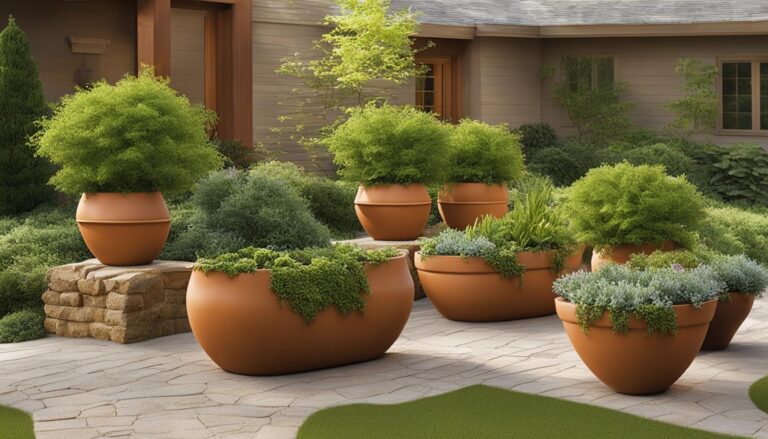
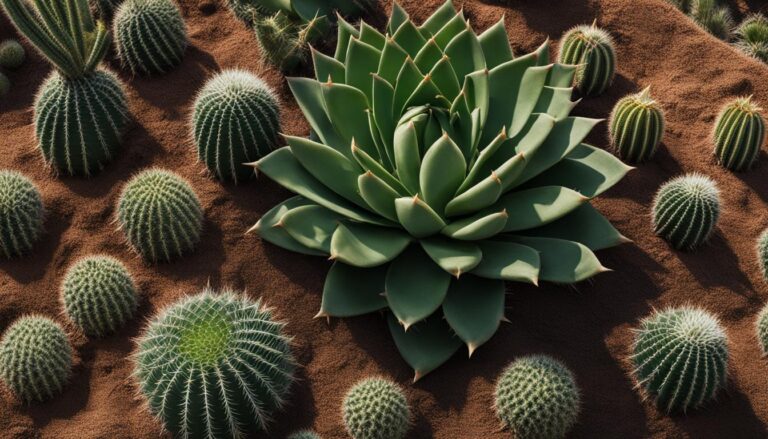
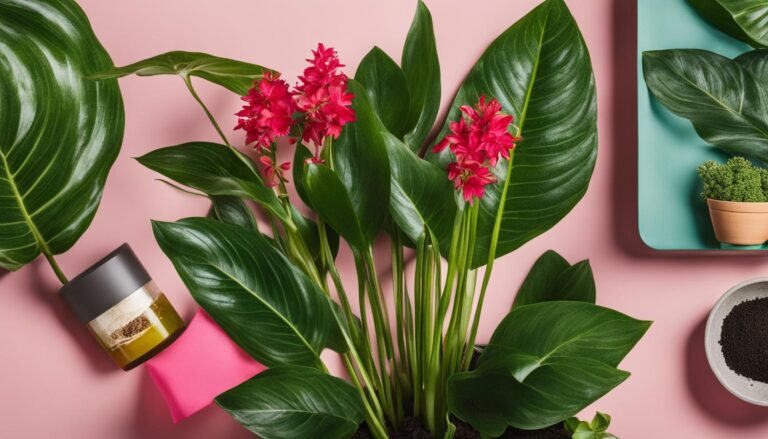
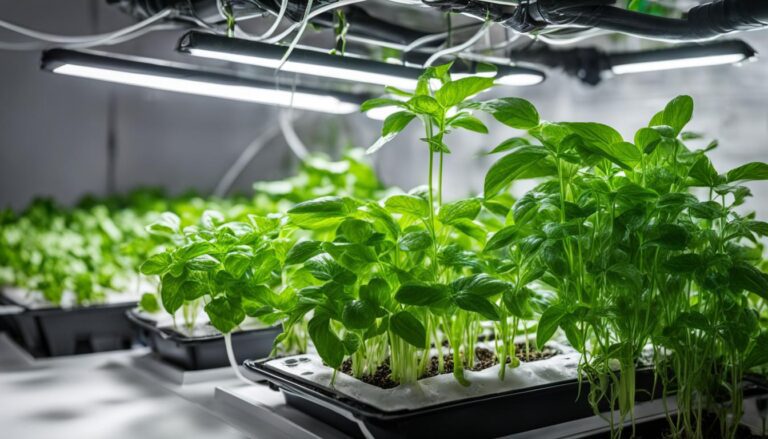
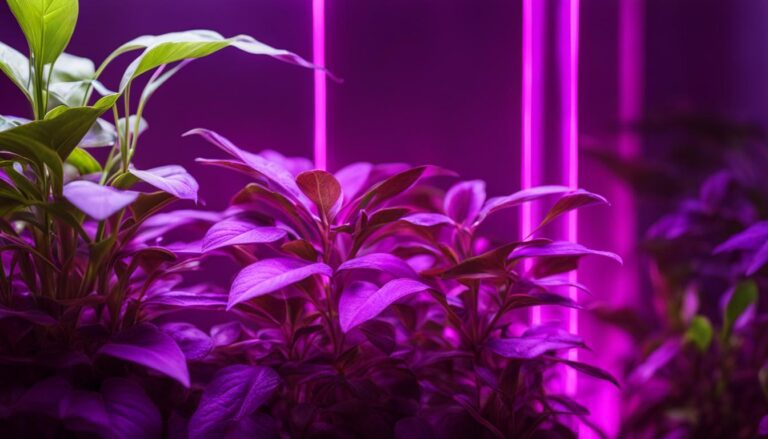
3 Comments
Comments are closed.